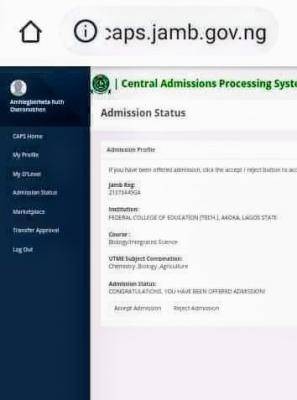
Sixteen-year-old Tochi Nwankwo looks stressed as he finished his 2015/2016 Unified Tertiary Matriculations Examination registrations at the JAMB Zonal Office, Enugu, Enugu State.
That he looked on edge while the registration process kept going did not come as an amazement to numerous individuals who know him well. The chap had motivations to bear on that way.
It was not that he couldn’t contend positively in the forthcoming UTME. No. When its all said and done, among his associates in his school at the Community High School, Amaozalla, Affa in Udi Local Government Area, and in his neigbourhood, he is a sparkling light, scholastically. He generally posted amazing brings about his examinations. Indeed, in his Junior Secondary School examination, two years back, he got a magnificent grade.
Actually amid the last short vacation classes where he, alongside others, took part in the activity, he held his head high, beating his counterparts from the urban communities in a significant number of the assignments given to them before the tutorials were given the ax for the alarm and the panic of the savage Ebola Virus Disease.
See: 2015 JAMB UTME Practice Software.
Similar Posts:
But, chief among the things racing in young Nwankwo’s mind was how he would handle the Computer Based Test in the forthcoming UTME proper. In his village school, computer education belongs to the realm of theory. Agreed, there is a computer teacher and a few facilities in his school, these attributes seem to be the end of the semblances of computer training in the institution. Apart from the fact that the gadgets cannot go round, there is no functional electricity or generator to power the facilities.
So, how is he going to cope with the “technicalities” involved in the JAMB-conducted electronic examination if he hopes to secure a place in the nation’s university next year? Again, would he be able to match the speed and, perhaps, the dexterity of his contemporaries from city schools, who will be sitting for the same examination with him? These and many more questions and worries conspired to unsettle the youngster last Wednesday.
See also: 2015 JAMB UTME Registration Details.
Nwankwo is not a loner in this dilemma. The fate of hundreds of many other young Nigerians is uncertain, as the JAMB CBT initiative goes full blast next year. The sale of the form, which commenced last September 15, will end on January 15, 2015, while the board’s website will close on January 19, 2015.
JAMB inaugurated the pilot scheme of the exercise, which it claimed was the elixir for curbing examination malpractice, two years ago. Canvassing the e-testing option, the JAMB Registrar, Prof. Dibu Ojerinde, had said, “It will ensure prompt delivery of raw scores; eliminate cases of incomplete results; eliminate result blackout and, above all, check examination malpractice.”
In the 2013/2014 academic session, the board conducted its UTME in three formats – Computer Based Test, Dual Based Test as well as the Paper Pencil Test – and no fewer than 1.6 million candidates sat for the examinations. Apart from the form fee of N4,000, many of the candidates paid extra N700 for the online registration exercise in about 5,628-licensed cyber cafes across the country.
For the 2014/2015 academic session, the board, however, insists that all candidates must go through the CBT procedure. It has already rolled out the fee requirements as well as the registered CBT centres for the exercise.
While some stakeholders are hailing the move, claiming that it is in tune with global best practices for such examinations, others are opposing the idea. For the latter school of thought, they doubt Nigeria’s readiness and the effectiveness of the logistics put in place by JAMB for the initiative’s full take-off.
According to the Education Rights Campaign, the reservations expressed by the likes of Nwankwos are more than real. In fact, the group believes that even in the many city schools, the issue of electricity is still a luxury, not to talk of those in far-flung countryside.
In fact, the ERC, through its Coordinator, Mr. Taiwo Hassan, thinks that the essence of the fresh initiative is to encourage mass failure in order to deny more teeming Nigerian youths admission opportunities.
He says, “Even in urban areas, how many public secondary schools have well equipped computer laboratories? How many of them are fitted with electricity? How many days in a week do they have electricity in their schools for them to be able to train the pupils in computer?
“The reality is that what JAMB is trying to do is something that will increase the level of mass failure in the system. Our position remains that CBT must be an option alongside others for candidates taking UTME, so far as computer training at the public primary and secondary schools still remains at the rudimentary level.
“Allowing CBT to prevail at this time would mean forcing thousands of candidates who do not have enough training in the use of computer to sit for the exam and the result will be mass failure.”
But the Head of Public Relations of JAMB, Mr. Fabian Benjamin, disagrees with the ERC boss. According to him, there are no complexities in the exercise, as an average user of the GSM telephone can conveniently answer the questions.
The spokesman says, “Telephone is even more complex to use and so I see no reason why some people are complaining about the CBT. Two, there is no part of the country today where the GSM revolution has not reached and even illiterate persons use them. So, there is no way an average secondary school pupil in the country today cannot use it.”
Having test-run the initiative for some years now, the time, he says, is ripe to go full scale in the exercise. Benjamin, who stresses that the e-platform will help solve many of the nation’s education challenges, notes that the board has, in the interim, at least 400 such centres across the country.
The Chairman, National Association Proprietors of Private Schools, Lagos State chapter, Mr. Yomi Otubela, also describes the initiative as a welcome development. According to him, it will offer Nigerians the opportunity to experience what obtains internationally in education and examinations.
He adds, “Computer as a subject has been in our curriculum for years and it is an avenue to further test the level of comprehension of pupils in computer examinations. Whether we like it or not, the use of computer is gradually coming to stay and it will phase out the use of paper in our school system. So, the reality is that soonest, the in-thing will be CBT. Also, many international exams, such as TOEFL (Test of English as a Foreign Language) are conducted on CBT platform. So, why are we frowning on exposing our pupils to it?”
Further agreeing with the JAMB official, Otubela notes that there are no difficulties accessing the exams. According to him, the process does not require any special skill provided the candidate knows how to move the cursor.
He declares, “Education is the ability to equip people for the future and for the labour market. If you are sending people to the university and they do not have minimum knowledge of how to use computer in this century, then they do not have any business to be there.”
Yet, a woman who supervised the examination at one of the centres in Lagos metropolis during the last UTME, who sought anonymity, recalls that it was a terrible experience for many candidates. According to her, many of them did not know what button to press on computers, let alone answering the questions on them.
She says, “As a mother, I felt like crying at a point. Up to about 15 minutes to the end of the exam, many candidates were just looking at the computers. They did not know what to do. Fear and anxiety were written on their faces. So, if those in Lagos could not operate computers, what do you expect from those in remote villages?
“As laudable as the intention is, I think the problem is that Nigeria likes to put the cart before the horse. We don’t do the first thing first. Why not first ensure that necessary structures and facilities are first put in place before banning the paper test? As things are now, you may be punishing many of these kids for offences they did not really commit.”
But an education consultant, Dr. Olusegun Omisore, sees the whole thing from a different perspective. For him, vesting admission responsibility on JAMB in the first place is wrong. According to him, the board has no business conducting admission examinations for the universities. The best the board can do, he says, is just to coordinate the outcome of what the different universities have done.
Dismissing the CBT initiative, he notes that there is no integrity in the system, no political will to enhance its advancement, just as the infrastructure, such as electricity is lacking in the country.
As if to buttress Omisore’s stand, stakeholders point out that apart from Lagos, Ogun, Edo, and Osun states that have between 10 and 15 CBT centres for the 2015 examination, others have between one and five centres. For instance, they note that while Kogi State has just one at the JAMB Zonal Office, Imo State has four.
Assuring that the board will provide more centres, Benjamin says JAMB is interested in using certified centres that have the competences for the examination. (Punch)




